-
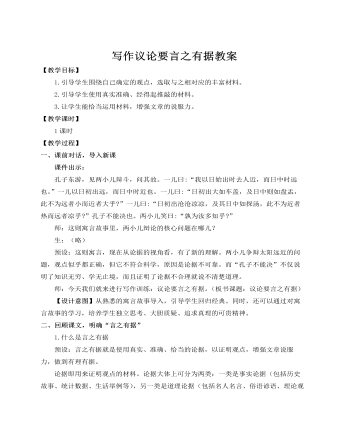
人教部编版语文九年级上册写作议论要言之有据教案
分析是联系论据与论点的桥梁,是丰富文章内容的关键所在。有了分析,事例和论点就能成为有机的统一体;只有通过理性的分析,剖析出事例与论点之间的关系,才能让文章拥有令人信服的逻辑力量。总结:运用论据的时候,对论据进行适当的变化、概括、分析,要有重点、有意识地突出所述事实论据和观点一致的地方,保证所述事实与观点相对应。可参照“分论点+事例+对事例进行分析+结论(照应分论点)”这样的格式来进行论证。【设计意图】以学生小组讨论来得出运用论据的三个方法 ,让学生自己在交流讨论中品味体验。通过“讨论”“交流”等形式实现学生的自主学习,达到培养学生独立思考能力和写作表达能力的目的。五、品读例文,评点“言之有据”1.根据文题,画思维导图课件出示:《论语·为政》中说:“人而无信,不知其可也。”诚信,自古以来就是一种美德。欺诈、造假等不讲诚信的现象历来为人们所深恶痛绝。请以《谈诚信》为题,尝试画一个议论文的思维导图。
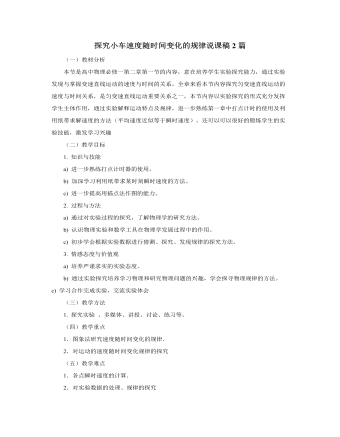
人教版新课标高中物理必修1探究小车速度随时间变化的规律说课稿2篇
(三)合作交流能力提升教师:刚才我们通过实验了解了小车的速度是怎样随时间变化的,但实验中有一定的误差,请同学们讨论并说出可能存在哪些误差,造成误差的原因是什么?(每个实验小组的同学之间进行热烈的讨论)学生:测量出现误差。因为点间距离太小,测量长度时容易产生误差。教师:如何减小这个误差呢?学生:如果测量较长的距离,误差应该小一些。教师:应该采取什么办法?学生:应该取几个点之间的距离作为一个测量长度。教师:好,这就是常用的取“计数点”的方法。我们应该在纸带上每隔几个计时点取作一个计数点,进行编号。分别标为:0、1、2、3……,测各计数点到“0”的距离。以减小测量误差。教师:还有补充吗?学生1:我在坐标系中描点画的图象只集中在坐标原定附近,两条图象没有明显的分开。学生2:描出的几个点不严格的分布在一条直线上,还能画直线吗?
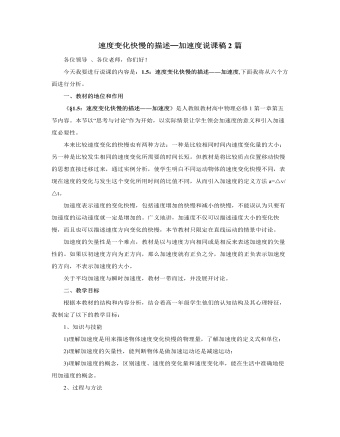
人教版新课标高中物理必修1速度变化快慢的描述─加速度说课稿2篇
本来比较速度变化的快慢也有两种方法:一种是比较相同时间内速度变化量的大小;另一种是比较发生相同的速度变化所需要的时间长短。但教材是将比较质点位置移动快慢的思想直接迁移过来,通过实例分析,使学生明白不同运动物体的速度变化快慢不同,表现在速度的变化与发生这个变化所用时间的比值不同,从而引入加速度的定义方法a=△v/△t。加速度表示速度的变化快慢,包括速度增加的快慢和减小的快慢,不能误认为只要有加速度的运动速度就一定是增加的。广义地讲,加速度不仅可以描述速度大小的变化快慢,而且也可以描述速度方向变化的快慢,本节教材只限定在直线运动的情景中讨论。加速度的矢量性是一个难点,教材是以与速度方向相同或是相反来表述加速度的矢量性的。如果以初速度方向为正方向,那么加速度就有正负之分,加速度的正负表示加速度的方向,不表示加速度的大小。
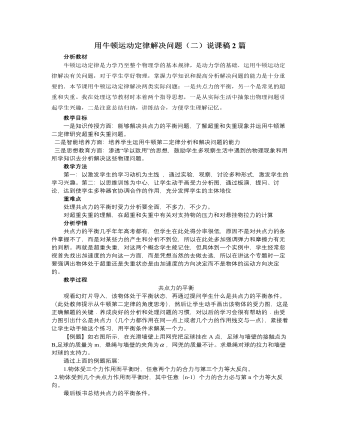
人教版新课标高中物理必修1用牛顿运动定律解决问题(二)说课稿2篇
教师活动:(1)组织学生回答相关结论,小组之间互相补充评价完善。教师进一步概括总结。(2)对学生的结论予以肯定并表扬优秀的小组,对不理想的小组予以鼓励。(3)多媒体投放板书二:超重现象:物体对支持物的压力(或对悬挂物的拉力)大于物体所受到的重力的情况称为超重现象。实质:加速度方向向上。失重现象:物体对支持物的压力(或对悬挂物的拉力)小于物体所受到的重力的情况称为失重现象。实质:加速度方向向下。(4)运用多媒体展示电梯中的现象,引导学生在感性认识的基础上进一步领会基本概念。4.实例应用,结论拓展:教师活动:展示太空舱中宇航员的真实生活,引导学生应用本节所学知识予以解答。学生活动:小组讨论后形成共识。教师活动:(1)引导学生分小组回答相关问题,小组间互相完善补充,教师加以规范。(2)指定学生完成导学案中“思考与讨论二”的两个问题。
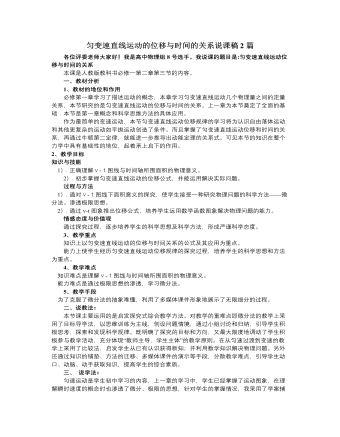
人教版新课标高中物理必修1匀变速直线运动的位移与时间的关系说课稿2篇
培养学生合作交流意识和探究问题的能力,这一部分知识层层递进,符合学生由特殊到一般、由简单到复杂的认知规律。4、互动探究(1)极限思想的渗透让学生阅读“思考与讨论”小版块.培养学生的自学和阅读能力提出下列问题,进行分组讨论:a、用课本上的方法估算位移,其结果比实际位移大还是小?为什么?b、为了提高估算的精确度,时间间隔小些好还是大些好?为什么?针对学生回答的多种可能性加以评价和进一步指导。让学生从讨论的结果中归纳得出:△t越小,对位移的估算就越精确。渗透极限的思想。通过小组内分工合作,讨论交流,培养学生交流合作的精神,以及搜集信息、处理信息的能力;通过小组间对比总结,使学生学会在对比中发现问题,在解决问题过程中提高个人能力;
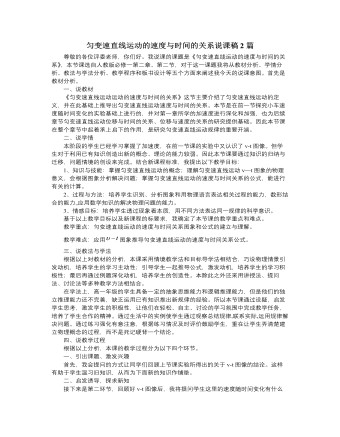
人教版新课标高中物理必修1匀变速直线运动的速度与时间的关系说课稿2篇
设计意图:几道例题及练习题,其中例1小车由静止启动开始行驶,以加速度 做匀加速运动,求2s后的速度大小?进而变式到:小车遇到红灯刹车……,充分体现了“从生活到物理,从物理到社会”的物理教学理念;例题及练习题由浅入深、由易到难、各有侧重,体现新课标提出的让不同的学生在物理上得到不同发展的教学理念。这一环节总的设计意图是反馈教学,内化知识。(6) 小结归纳,拓展深化我的理解是,小结归纳不应该仅仅是知识的简单罗列,而应该是优化认知结构,完善知识体系的一种有效手段,为充分发挥学生的主题作用,从学习的知识、方法、体验是那个方面进行归纳,我设计了这么三个问题:① 通过本节课的学习,你学会了哪些知识;② 通过本节课的学习,你最大的体验是什么;③ 通过本节课的学习,你掌握了哪些学习物理的方法?
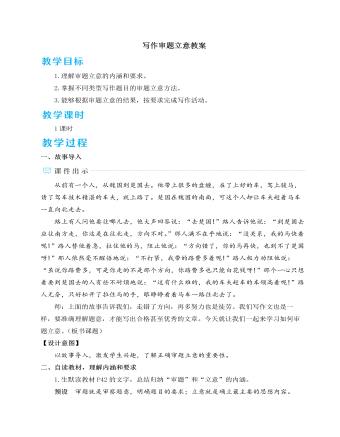
人教部编版语文九年级下册写作审题立意教案
立意:①这个世界带给我们的苦难或人生的挫折,是人生中必须经历的一种磨炼,需要我们用积极乐观的心态去面对。②要积极、乐观地面对生活中的灾难或人生的挫折,因为灾难或挫折有助于成长。③我们要乐观地面对生活中的困境。……以上表述,都可视作正确立意。题目三:有人说助力成长的是梦想,有人说助力成长的是亲人的鼓励与陪伴,有人说助力成长的是挑战困难的勇气、坚强的意志、果断的行动力……同学们,助力你成长的是什么呢?请自拟题目,写一篇文章。要求:(1)紧扣主题,内容具体充实;(2)有真情实感;(3)文体不限(诗歌、戏剧除外);(4)不少于600字;(5)文中请回避与你相关的人名、校名、地名。预设 审题:这是一道材料作文题。审读材料可知,材料的核心词语是“助力成长”,材料最后一句“助力你成长的是什么呢?”提示我们要思考什么是可以帮助我们成长的。助力成长的可以是材料中提及的梦想,亲人的鼓励和陪伴,勇气、意志、行动力等,还可以是生活中的某些具体的人或事,如书本、老师、跑步等。立意:①梦想助力成长。②勇气助力成长。
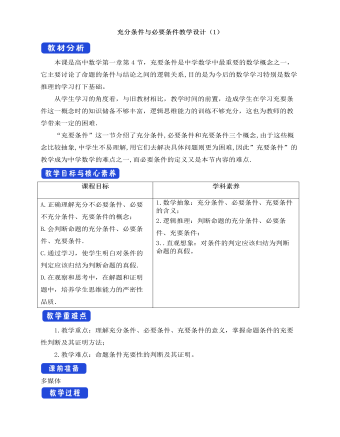
人教A版高中数学必修一充分条件与必要条件教学设计(1)
本课是高中数学第一章第4节,充要条件是中学数学中最重要的数学概念之一, 它主要讨论了命题的条件与结论之间的逻辑关系,目的是为今后的数学学习特别是数学推理的学习打下基础。从学生学习的角度看,与旧教材相比,教学时间的前置,造成学生在学习充要条件这一概念时的知识储备不够丰富,逻辑思维能力的训练不够充分,这也为教师的教学带来一定的困难.“充要条件”这一节介绍了充分条件,必要条件和充要条件三个概念,由于这些概念比较抽象,中学生不易理解,用它们去解决具体问题则更为困难,因此”充要条件”的教学成为中学数学的难点之一,而必要条件的定义又是本节内容的难点.A.正确理解充分不必要条件、必要不充分条件、充要条件的概念;B.会判断命题的充分条件、必要条件、充要条件.C.通过学习,使学生明白对条件的判定应该归结为判断命题的真假.D.在观察和思考中,在解题和证明题中,培养学生思维能力的严密性品质.
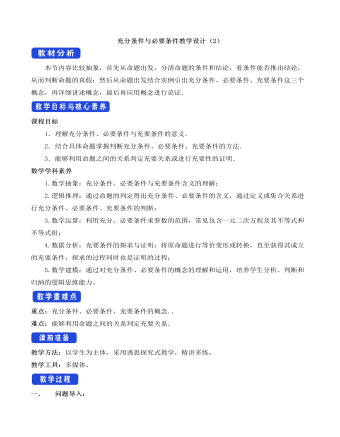
人教A版高中数学必修一充分条件与必要条件教学设计(2)
【例3】本例中“p是q的充分不必要条件”改为“p是q的必要不充分条件”,其他条件不变,试求m的取值范围.【答案】见解析【解析】由x2-8x-20≤0得-2≤x≤10,由x2-2x+1-m2≤0(m>0)得1-m≤x≤1+m(m>0)因为p是q的必要不充分条件,所以q?p,且p?/q.则{x|1-m≤x≤1+m,m>0}?{x|-2≤x≤10}所以m>01-m≥-21+m≤10,解得0<m≤3.即m的取值范围是(0,3].解题技巧:(利用充分、必要、充分必要条件的关系求参数范围)(1)化简p、q两命题,(2)根据p与q的关系(充分、必要、充要条件)转化为集合间的关系,(3)利用集合间的关系建立不等关系,(4)求解参数范围.跟踪训练三3.已知P={x|a-4<x<a+4},Q={x|1<x<3},“x∈P”是“x∈Q”的必要条件,求实数a的取值范围.【答案】见解析【解析】因为“x∈P”是x∈Q的必要条件,所以Q?P.所以a-4≤1a+4≥3解得-1≤a≤5即a的取值范围是[-1,5].五、课堂小结让学生总结本节课所学主要知识及解题技巧
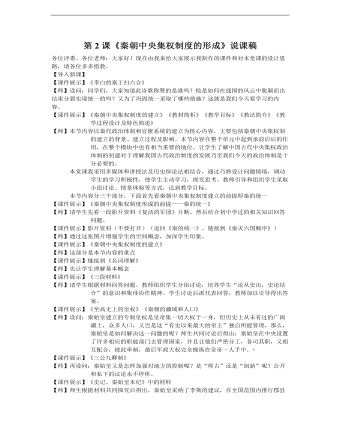
高中历史人教版必修一《第2课秦朝中央集权制度的形成》说课稿
【课件展示】《秦朝中央集权制度的建立》《教材简析》《教学目标》《教法简介》《教学过程设计及特色简述》【师】本节内容以秦代政治体制和官僚系统的建立为核心内容,主要包括秦朝中央集权制的建立的背景、建立过程及影响。本节内容在整个单元中起到承前启后的作用,在整个模块中也有相当重要的地位。让学生了解中国古代中央集权政治体制的初建对于理解我国古代政治制度的发展乃至我们今天的政治体制是十分必要的。 本堂课我采用多媒体和讲授法及历史辩论法相结合,通过巧妙设计问题情境,调动学生的学习积极性,使学生主动学习,探究思考。教师引导和组织学生采取小组讨论、情景体验等方式,达到教学目标。 本节内容分三个部分,下面首先看秦朝中央集权制度建立的前提即秦的统一

人教版高中历史必修3现代中国教育的发展说课稿
一、教材分析下面我来谈一谈对教材的认识:主要从教材的地位和作用、以及在此基础上确立的教学目标、教学重难点这三个方面来谈。首先,来谈教材的地位和作用:本课教材内容主要从三个方面向学生介绍了现代中国教育的发展状况和趋势:人民教育的奠基、动乱中的教育和教育的复兴,全面讲述了新中国教育的三个阶段。本课是文化史中中国史部分的最后一课, 也是必修三册书中唯一涉及教育的一课。而教育是思想文化史中的重要组成部分,江泽民同志在谈到教育的时候曾经说过,“百年大计,教育为本。教育为本,在于育人”。教育是关系国计民生的大事。学生通过学习新中国教育发展的史实,理解“科教兴国”、“国运兴衰,系于教育”的深刻含义。最终由此激发学生树立“知识改变命运、读书成就人生”的信念,树立勤奋学习、成人成才、报效祖国、服务社会的崇高理想。故本课的教学有极大的现实意义。谈完了教材的地位和作用,我再分析一下教学目标:
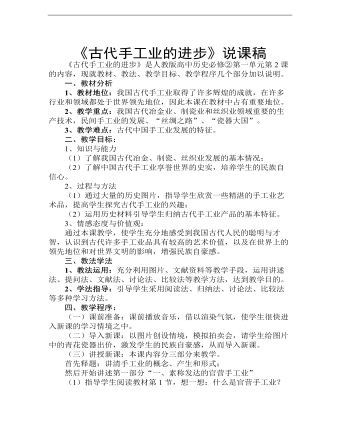
高中历史人教版必修二《第2课古代手工业的进步》说课稿
二、教学目标:1、知识与能力(1)了解我国古代冶金、制瓷、丝织业发展的基本情况;(2)了解中国古代手工业享誉世界的史实,培养学生的民族自信心。2、过程与方法(1)通过大量的历史图片,指导学生欣赏一些精湛的手工业艺术品,提高学生探究古代手工业的兴趣;(2)运用历史材料引导学生归纳古代手工业产品的基本特征。3、情感态度与价值观:通过本课教学,使学生充分地感受到我国古代人民的聪明与才智,认识到古代许多手工业品具有较高的艺术价值,以及在世界上的领先地位和对世界文明的影响,增强民族自豪感。
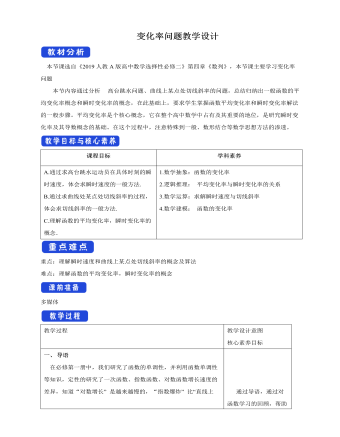
人教版高中数学选择性必修二变化率问题教学设计
导语在必修第一册中,我们研究了函数的单调性,并利用函数单调性等知识,定性的研究了一次函数、指数函数、对数函数增长速度的差异,知道“对数增长” 是越来越慢的,“指数爆炸” 比“直线上升” 快得多,进一步的能否精确定量的刻画变化速度的快慢呢,下面我们就来研究这个问题。新知探究问题1 高台跳水运动员的速度高台跳水运动中,运动员在运动过程中的重心相对于水面的高度h(单位:m)与起跳后的时间t(单位:s)存在函数关系h(t)=-4.9t2+4.8t+11.如何描述用运动员从起跳到入水的过程中运动的快慢程度呢?直觉告诉我们,运动员从起跳到入水的过程中,在上升阶段运动的越来越慢,在下降阶段运动的越来越快,我们可以把整个运动时间段分成许多小段,用运动员在每段时间内的平均速度v ?近似的描述它的运动状态。
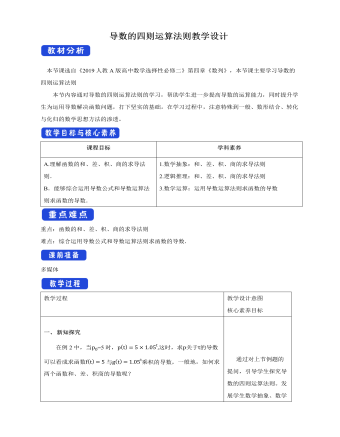
人教版高中数学选择性必修二导数的四则运算法则教学设计
求函数的导数的策略(1)先区分函数的运算特点,即函数的和、差、积、商,再根据导数的运算法则求导数;(2)对于三个以上函数的积、商的导数,依次转化为“两个”函数的积、商的导数计算.跟踪训练1 求下列函数的导数:(1)y=x2+log3x; (2)y=x3·ex; (3)y=cos xx.[解] (1)y′=(x2+log3x)′=(x2)′+(log3x)′=2x+1xln 3.(2)y′=(x3·ex)′=(x3)′·ex+x3·(ex)′=3x2·ex+x3·ex=ex(x3+3x2).(3)y′=cos xx′=?cos x?′·x-cos x·?x?′x2=-x·sin x-cos xx2=-xsin x+cos xx2.跟踪训练2 求下列函数的导数(1)y=tan x; (2)y=2sin x2cos x2解析:(1)y=tan x=sin xcos x,故y′=?sin x?′cos x-?cos x?′sin x?cos x?2=cos2x+sin2xcos2x=1cos2x.(2)y=2sin x2cos x2=sin x,故y′=cos x.例5 日常生活中的饮用水通常是经过净化的,随着水的纯净度的提高,所需进化费用不断增加,已知将1t水进化到纯净度为x%所需费用(单位:元),为c(x)=5284/(100-x) (80<x<100)求进化到下列纯净度时,所需进化费用的瞬时变化率:(1) 90% ;(2) 98%解:净化费用的瞬时变化率就是净化费用函数的导数;c^' (x)=〖(5284/(100-x))〗^'=(5284^’×(100-x)-"5284 " 〖(100-x)〗^’)/〖(100-x)〗^2 =(0×(100-x)-"5284 " ×(-1))/〖(100-x)〗^2 ="5284 " /〖(100-x)〗^2

人教版高中数学选择性必修二导数的概念及其几何意义教学设计
新知探究前面我们研究了两类变化率问题:一类是物理学中的问题,涉及平均速度和瞬时速度;另一类是几何学中的问题,涉及割线斜率和切线斜率。这两类问题来自不同的学科领域,但在解决问题时,都采用了由“平均变化率”逼近“瞬时变化率”的思想方法;问题的答案也是一样的表示形式。下面我们用上述思想方法研究更一般的问题。探究1: 对于函数y=f(x) ,设自变量x从x_0变化到x_0+ ?x ,相应地,函数值y就从f(x_0)变化到f(〖x+x〗_0) 。这时, x的变化量为?x,y的变化量为?y=f(x_0+?x)-f(x_0)我们把比值?y/?x,即?y/?x=(f(x_0+?x)-f(x_0)" " )/?x叫做函数从x_0到x_0+?x的平均变化率。1.导数的概念如果当Δx→0时,平均变化率ΔyΔx无限趋近于一个确定的值,即ΔyΔx有极限,则称y=f (x)在x=x0处____,并把这个________叫做y=f (x)在x=x0处的导数(也称为__________),记作f ′(x0)或________,即
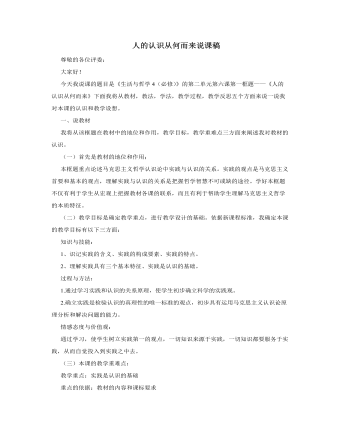
人教版高中政治必修4人的认识从何而来说课稿(二)
今天我说课的题目是《生活与哲学4(必修)》的第二单元第六课第一框题——《人的认识从何而来》下面我将从教材,教法,学法,教学过程,教学反思五个方面来说一说我对本课的认识和教学设想。一、说教材我将从该框题在教材中的地位和作用,教学目标,教学重难点三方面来阐述我对教材的认识。(一)首先是教材的地位和作用;本框题重点论述马克思主义哲学认识论中实践与认识的关系。实践的观点是马克思主义首要和基本的观点,理解实践与认识的关系是把握哲学智慧不可或缺的途径。学好本框题不仅有利于学生从宏观上把握教材各课的联系,而且有利于帮助学生理解马克思主义哲学的本质特征。(二)教学目标是确定教学重点,进行教学设计的基础。依据新课程标准,我确定本课的教学目标有以下三方面:知识与技能:1、识记实践的含义、实践的构成要素、实践的特点。
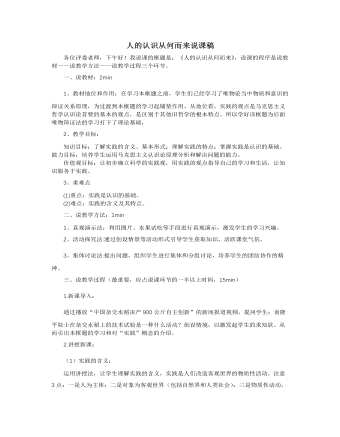
人教版高中政治必修4人的认识从何而来说课稿(一)
展示学习过的物理学内容:伽利略的“比萨斜塔”实验,证明了:两个铁球同时落地。得出结论:实践是检验认识正确与否的唯一标准。(因为这点理解起来有点难,所一教师要适当的讲解)A、一种认识是否是真理不能由这一认识本身回答B、客观事物自身也不能回答认识是否正确地反映了它C、实践是联系主观与客观的桥梁。人们把认识和实践的结果对照,相符合,认识就正确。○4实践是认识的目的和归宿:走进社会:(课本P46归国博士案例)从这个故事中我们可以得到什么启示?得出结论:实践是认识的归宿和目的。启发学生学以致用,eg:纪中的学生研究地沟油简易检测方法(灵活利用身边的教学资源)。【板书设计】实践是认识的基础(板书)投影:逐步展示本课知识结构图。学生通过回忆,让学生有直观的认识,学习内容一目了然。1.实践是认识的来源。2.实践是认识发展的动力。3.实践是检验认识的真理性的唯一标准。
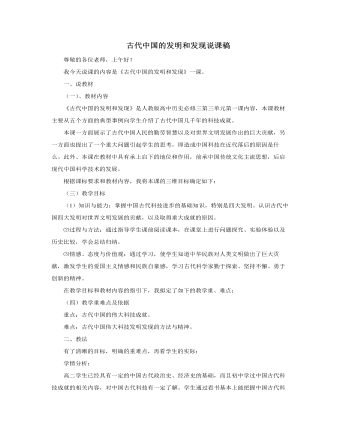
人教版高中历史必修3古代中国的发明和发现说课稿
一、说教材(一)、教材内容《古代中国的发明和发现》是人教版高中历史必修三第三单元第一课内容,本课教材主要从五个方面的典型事例向学生介绍了古代中国几千年的科技成就。本课一方面展示了古代中国人民的勤劳智慧以及对世界文明发展作出的巨大贡献,另一方面也提出了一个重大问题引起学生的思考,即造成中国科技在近代落后的原因是什么。此外、本课在教材中具有承上启下的地位和作用,前承中国传统文化主流思想,后启现代中国科学技术的发展。根据课标要求和教材内容,我将本课的三维目标确定如下:(三)教学目标(1)知识与能力:掌握中国古代科技进步的基础知识,特别是四大发明。认识古代中国四大发明对世界文明发展的贡献,以及取得重大成就的原因。⑵过程与方法:通过指导学生课前阅读课本,在课堂上进行问题探究、实验体验以及历史比较,学会总结归纳。
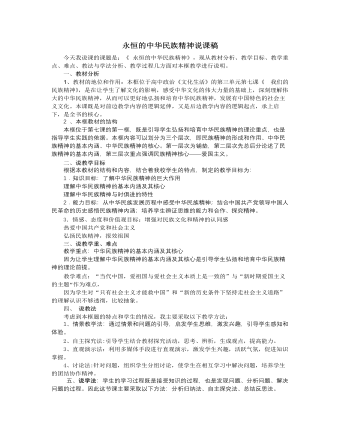
人教版高中政治必修3永恒的中华民族精神说课稿
(4)自强不息 (引导学生简要了解介绍 “大禹治水”“ 愚公移山”“ 夸父追日”“ 富贵不能淫”等典故名言,注重从优秀传统文化和中华民族精神之间的关系角度总结。)三、永远高扬的爱国主义旗帜这一目讲述中华民族精神的核心,新时期爱国主义的主题。【探究三】:1、团结统一、爱好和平、勤劳勇敢、自强不息共同体现着一个什么主题?2、你知道哪些我国抒发爱国情怀的诗词格言警句?哪些历史故事或者你身边的事例体现出了爱国主义的精神追求?你认为新时期我国爱国主义主要体现在哪些方面?学生四人一个小组讨论,选派代表发言【师生总结】:1、爱国主义是中华民族精神的核心,是中华民族的精神支柱。2、新时期爱国主义的主题:爱国主义是具体的,不同时期有不同的内涵,新时期爱国与爱社会主义本质上是一致的,发展中国特色社会主义,拥护祖国统一是新时期爱国主义的主题。
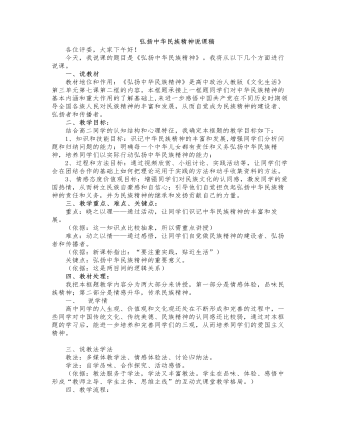
人教版高中政治必修3弘扬中华民族精神说课稿
3、评:以评促行。(6分钟)高中生的年龄特点决定了他们非常重视别人对自己的评价,渴望得到他人的肯定与鼓励。(所以我在班上组织一个活动:让同学们评选出班上“讲文明懂礼貌的文明之星”、“勤思考善创新的学习之星”(先让同学推举大家都认同的4位同学,然后对他们进行投票,投票结果将在下堂课上公布)以此活动来激发同学们用实际行动做民族精神的践行者和传播者。)4、唱:以情激行。(2分钟)在课程内容讲授结完毕后,组织全班同学跟着音乐高唱孙楠的《红旗飘飘》,生化情感,激发同学们的爱国情感。五、课堂拓展(请同学们各展才华:课后让同学们各自准备一个项目以体现民族精神。(项目形式是:或作文、书画;或剪纸、或歌曲小品)……让同学们用实际行动祝愿我们伟大的祖国更加繁荣昌盛!让我们的民族精神代代相传!)



